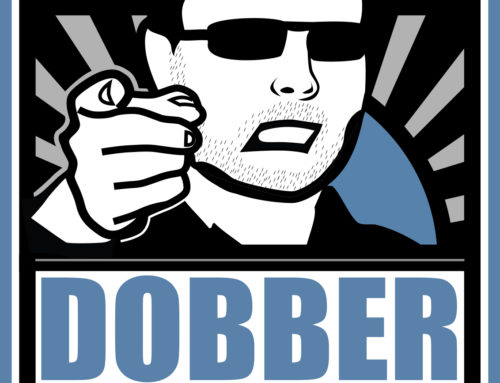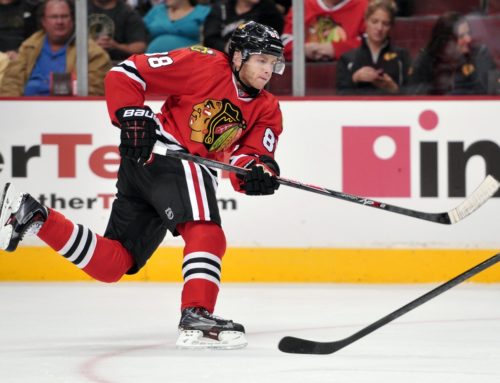
Joe Sakic's wrist shot could have put a hole through my body, but his words of wisdom never failed to fill my mind. I was so fortunate to cover his final season as a pro, so I always paid extremely close attention to all of his post-game quotes. One of these quips took place early last season before the back problems sidelined him for good. It has since resonated in my mind, as it is quickly becoming an important factor in the world of fantasy goaltending.
"Rest is a weapon…" he said. Although he meant that in a sort of joking, nonchalant manner, it was quite accurate.
Every goalie wants to play all 82 games, regardless of how tired they feel. But physical wear and tear leads to a lack of mental strength, which leads to lapses in focus and things like bad rebound control, weak goals and the inability to snap into a rhythm. So whether goalies like it or not, only the most elite are exempt from this law of human nature.
One of these elite masterminds is Evgeni Nabokov. He has played more minutes than any other goalie, a total of 1,314:28 to be exact. But he also has a stellar 2.16 GAA and a .926 save percentage in 22 games. That's simply outstanding and so impressive that, in my opinion, he's the most valuable fantasy goalie in the league. But what makes him so durable and capable of overcoming the pangs of a heavy workload? It is his unique playing style.
With a very narrow butterfly stance that almost makes him look like a stand-up goalie, Nabokov plays in a manner that doesn't force him to exert a lot of energy when making a lot of saves. Compared to the style of goalies like Pascal Leclaire, Antti Niemi or Ondrej Pavelec, Nabokov is quite refined. He's a veteran who understands the value of using a number of different save styles so that he only exerts as much energy as is needed to stop the puck. He relies on excellent positioning to get his core behind the puck and he doesn't get too high or too low emotionally. He's cool, calm and collected, a master of situational awareness. He plays the game from beyond the crease and recognizes the ebbs and flows of momentum. He knows when to turn on the jets and when to save gas for later.
At the end of the day, Nabokov may play a lot of games, but you won't notice it because he doesn't waste energy like the younger, more hybrid butterfly goalies. On the flip side, you can't go 20 minutes without guys like Leclaire or Pavelec making a strenuous-looking reaction or desperation-like save. Not that there's anything wrong with that, but over time it wears you down. Martin Brodeur and Chris Osgood are two other veterans that know how to conserve energy and play the position using a multitude of different save styles. This allows them to stay fresh and energetic for when they need it most. If you can stand up to make a save and still control the rebound, you are better than the one that makes a flashy save. It's about efficient footwork and making the save through the least amount of work.
When you look at the current schedule, the games are beginning to get more and more condensed. The following teams play four games this week: Anaheim, Boston, Calgary, Carolina, Colorado, Columbus, Dallas, Detroit, Edmonton, Florida, Nashville, NY Islanders, NY Rangers, Ottawa, Philadelphia, Phoenix, Pittsburgh and St. Louis. The rest of the teams play three games. It all comes to a boiling point when 20 teams play back-to-backs on Friday and Saturday night, mainly due to Thursday's Thanksgiving holiday. Let's hope the madness doesn't consume us all.
So why do some coaching staffs continue to overload their starters with so many games? Maybe they aren't confident in their backup. Maybe they're just unaware of the detrimental effect too many minutes in the first two months can have in an Olympic year. Maybe they are resigned to just letting the goalie call the shots. Regardless of the situation, you know it's different for each team and it ultimately doesn't matter.
The good news is that you can take control of the goalies on your fantasy team by benching and starting them at will. You have the power to control the minutes your goalies play. If more teams handled their goaltending like the Bruins, maybe you wouldn't see so many injuries, inflated statistics or inconsistent play from your own fantasy goalies.
Tuukka Rask has already played eight games this year and has a 5-2-1 record with a 2.31 GAA and .917 save percentage. Tim Thomas has played 14 games, has a 5-6-3 record but a 2.33 GAA and .918 save percentage. Now that's what I call managing minutes for an obvious Olympic goaltender. Thomas has not been over-worked but has played enough to turn around a rough start in a hurry as he's back into a quality rhythm.
CRAIG ANDERSON
Some teams may not have this luxury, however. Colorado, for example, obviously does not have a ton of confidence in Peter Budaj, thus Anderson is getting all of the minutes he can handle.
A few weeks ago, a segment I wrote titled Craig Anderson is Tired explained how his workload seemed excessive through the first 15 games. Things haven't changed at all, as he's only 1-3-1 in his last five games and has allowed 18 goals in that span. He has faced the most shots in the league at a total of 685. He has started every game for the Avs this year except two of them. Last season he played in 31 games altogether.
Looking closer at his play, the source of his struggle has been an inability to stay focused as the game goes on. He starts out with the usual outstanding energy and focus, but by the time the third period arrives, he's just not the same. And since Colorado plays four games this week – tonight against the Flyers, Wednesday against Nashville and then a back-to-back series against Minnesota over the weekend – if he plays three out of four, it's really one too many.
Regardless of the reasoning behind Anderson's heavy workload, the onus falls on Budaj to play better for the team and coaches. He needs to go guns-a-blazin' and exude some confidence so that the coaching staff can rely on his services more often. This is the only way Anderson is going to get some rest. But as long as Budaj has no confidence and fails to get into a rhythm because he's not playing very often, Anderson is going to fail to get some much-needed mental rest. Again, let me stress that it's not that Anderson is physically tired. It's more that sustaining solid mental strength, when facing so many shots in such a condensed schedule, is a lot easier said than done.
NIKOLAI KHABIBULIN
Khabibulin, who is currently out with back issues, owns a 33.4 shots-per-game average (602 in 18 games), which is the highest in the league. He's on a young team that had a very strong start to the season (6-2-1), but has since been suffering from injuries and illnesses. That has led to a major problem scoring goals. At this point, I am not sure how much time Khabibulin will miss, but with any type of back injury, it's usually a few more games than one would think.
Eighteen games may not seem like a lot through the first quarter of the season, but when you exert as much energy as Khabibulin does, it is no surprise he is suffering from being over-worked. The guy drinks more water than a wooly mammoth, has holes drilled in his skates and uses three sets of gloves every game. Just about every trick in the book to keep this guy hydrated has been employed, except for just benching him in a game he'd normally start.
PASCAL LECLAIRE
Although it doesn't seem to be serious, Leclaire's "lower-body injury" was a very scary few days for his fantasy owners. It's reported that Brian Elliott will get the start tonight with Leclaire backing up. So while you breathe a sigh of relief, you can also take solace in the fact that Leclaire has only played in 16 games and has a decent 8-5-1 record. The stats are not great though – he only has a .901 save percentage and a 2.71 GAA so far this season.
But like I've said before, the problem with Leclaire's minutes is that his style lends a hand to injury proneness. He's not a big goalie by any means and makes himself smaller by using a compact, but wide butterfly stance. His knees and ankles sustain a lot of pressure due to this, something that is perpetuated by the fact he relies on his reflexes and agility to make a lot of saves. Because he exerts so much energy over the course of a game, he becomes more prone to struggling over the grueling 82-game schedule. To be honest, he's just not built to be a 70-75 game goalie.
JONATHAN QUICK
Jon Quick is second in the league in minutes played (1309) and currently holds a 12-8-2 record with a 2.79 GAA and only a .894 save percentage. I have talked about Quick's style and struggles already, but I'm caught trying to figure out a real justifiable reason for why he's playing so many games.
It can't be because he is a proven starter like the elite goalies in the league – this is only his second season. Erik Ersberg is a quality goalie when he's actually used…he just needs to be used more. Quick has not had a lot of practice time due to the hectic schedule and young goalies need this more than most other goalies.
In conclusion, the foundation of an exhausted goaltender is not a matter of their skill-set weakening. It's more about their understanding of how to play the position on a nightly basis when you are expected to start close to 70 games. Goalies have to think, act and play differently. They have to find ways to conserve energy on and off the ice.
We all know the adage "Sound body, sound mind." The more you understand this aspect of goaltending, the better decisions you will make over the course of the season. Remember that we as fantasy managers have the power to manage a goalie's minutes. It might be difficult to bench a quality starter on certain nights, but you have to take quality starts over quantity, otherwise there are more chances to lose those categories.





 FLA
FLA CHI
CHI NYR
NYR PIT
PIT L.A
L.A COL
COL PHI
PHI CAR
CAR VGK
VGK ANA
ANA N.J
N.J VAN
VAN TOR
TOR WPG
WPG CBJ
CBJ T.B
T.B
